RNC 2020: Key takeaways from Trump speech and Republican convention
- Posted By: Studio
- Coronavirus
- Updated: 26 April, 2024 20:39
- 1386
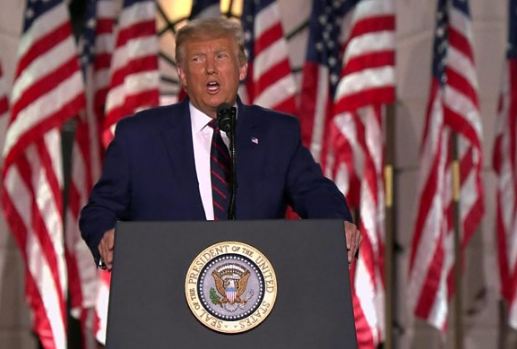
On the day of Trump's speech, the White House grounds had the look of a fortress. Security officers erected multiple layers of barrier fencing around the grounds to prevent protesters from disrupting the president's convention acceptance speech, given from the executive mansion's south lawn.
While law enforcement was building a physical protective bubble around the White House, the Republican Party has spent the past four days constructing a psychological bubble around the president - a more comforting reality sheltered from the tumult of the past six months.
The goal for the party this week has been to welcome a winning coalition of voters into this bubble - not just Trump's loyal base, but also disaffected suburbanites who may be uncomfortable with the president's policies, women put off by his confrontational tone and ethnic minorities concerned about the nation's growing racial tensions
Recent polls have indicated a sizeable majority of Americans believe the nation is heading in the wrong direction. That's poison for an incumbent president seeking re-election.
The Republicans, from the president on down, sought to prove that things are actually good and getting better - or, at least, that they would be markedly worse under Democrat Joe Biden.
It's a tall order, but here are six ways the president and his party tried to pull it off.
Selling Covid-19 as a success story
There have been nearly six million cases of Covid-19 in the US, and more than 180,000 fatalities. That is a cold, hard fact that Trump and the Republicans spent the week trying to talk around. For the first time, high-profile party figures like Mike Pence, Melania Trump and President Trump himself offered sympathies for those who had lost loved ones.
"As one nation, we mourn, we grieve, and we hold in our hearts forever the memories of all of those lives so tragically taken," Trump said. "In their honour, we will unite. In their memory, we will overcome."
The Republicans focused on the steps the president did take, such as banning some travel to the US from China (although commercial flights had already been stopped), streamlining and co-ordinating research into therapeutics, the just-announced $750m on new rapid-result coronavirus tests and talk of a coming miracle of American ingenuity - a vaccine - before the end of the year.
Aside from a passing reference by the president himself during a segment from the White House on Monday, they glossed over previous promised breakthroughs like hydroxychloroquine and breezed past the fact that the head of the Food and Drug Administration (FDA) walked back the benefits of the convalescent plasma the president touted on Sunday.
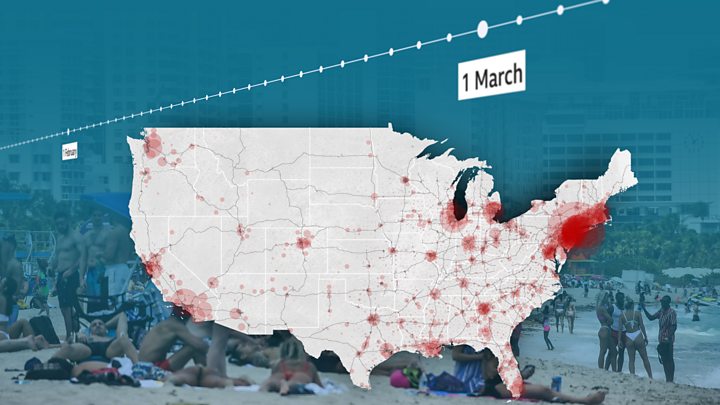
Many of the speakers referred to the coronavirus pandemic in the past tense, suggesting - or perhaps wishing - that the worst is past.
"We are delivering lifesaving therapies, and will produce a vaccine before the end of the year, or maybe even sooner," Trump said. "We will defeat the virus, end the pandemic, and emerge stronger than ever before."
The president's re-election hinges on American voters believing this, even as the virus continues to take a devastating toll on the US - one much worse than many other industrialised nations of the world.
Promising another economic comeback
At the beginning of the year, the president's 2020 campaign was all set to run hard on the strength of the US economy, in its 127th month of expansion, as the reason why the president should be given another four years in office. That all changed with the pandemic.
Now the US is in the midst of a record-setting recession, with double-digit unemployment and sagging consumer confidence.
There are signs of life, however, and Trump and the Republicans were quick to tout them this week. The stock market is once again reaching new highs, and business purchases are bouncing back. Polls indicate the president still gets his best marks when it comes to how he has handled the economy.
The main focus of the Republican convention, however, seemed to be to remind Americans of the economic accomplishments that took place before the pandemic - the 2017 tax cut law, renegotiated trade deals with Canada, Mexico and South Korea, and what was once record-low unemployment.
The central argument for the Republicans has been that things were good under the first three years of the Trump administration, so he's the one who can make them good again.
"In a new term as president," Trump said in his acceptance speech, "we will again build the greatest economy in history - quickly returning to full employment, soaring incomes, and record prosperity".
Or, as Pence put it more succinctly on Wednesday, Trump will "make America great again. Again".
A racial make-over
Trump has had a mixed record on race during his time in the White House. Although his administration helped shepherd a bipartisan criminal justice reform bill through Congress, the president's opponents have charged that his words - and particularly, his tweets - have frequently undermined his actions.
They've pointed to the president's tepid efforts to address the message behind recent protests against police brutality and systemic racism as yet further evidence of his indifference to the concerns of the black community.
This week, the Republicans made a determined effort to portray the president as, in fact, that community's under-appreciated champion.
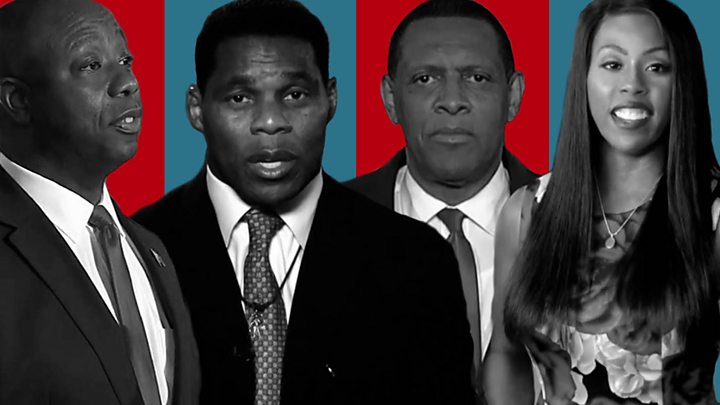
Night after night, convention speakers offered personal and professional affirmations that Trump cared about black Americans. Former football star Herschel Walker, Senator Tim Scott, Kentucky Attorney General Daniel Cameron, housing secretary Ben Carson, White House staffer Ja'Ron Smith - it was perhaps the most emphasis at any modern Republican convention on trying to reach out to black voters.
"Donald Trump truly cares about black lives," said Clarence Henderson, a 1960s civil rights protestor who spoke to the convention on Wednesday night. "His policies show his heart."
In somewhat controversial displays of presidential power during a political convention, Trump pardoned Jon Ponder, a convicted felon who now runs a programme assisting former inmates re-entering society, and oversaw the citizenship ceremony for a diverse group of immigrants.
The intended message was clear - as is the strategic intent.
In 2016, black voters made up 10% of the electorate, with 90% voting for Democrat Hillary Clinton. If Trump could chip away at the Democrats' support in this demographic, it would pay real dividends - particularly in Midwest swing states that the president narrowly won four years ago. Words of praise from the black community may also help put moderate Republicans concerned by Trump's racial divisiveness more at ease.
"I have done more in three years for the black community than Joe Biden has done in 47 years," Trump said. "And when I'm re-elected, the best is yet to come."
For more than three months, racial issues in the US have been a growing conflagration whose fires the president has at times stoked, four days of convention outreach notwithstanding. The recent unrest in Wisconsin may offer hints that if the president is re-elected, more protests and clashes like it are yet to come.
The law and order president
Four years ago in his convention acceptance speech, Trump promised that "the crime and violence that afflicts our nation will soon come to an end". In his inaugural address, he said that "this American carnage stops right here and stops right now".
Three and a half years later, however, violent crime in the US is ticking up in some cities and protests over police brutality have at times turned ugly. Hence, the president's argument has become that it's the fault of state and local Democrats - and voters can send them a message through Trump's re-election.
"Your vote will decide whether we protect law abiding Americans, or whether we give free reign to violent anarchists, agitators, and criminals who threaten our citizens," Trump said.
Ever since the mass protests following George Floyd's death began, the president has focused his attention on the violence in places like Minneapolis, Portland, Chicago and now Kenosha, Wisconsin, rather than the police actions that instigated them. Such was once again the case on Thursday night.
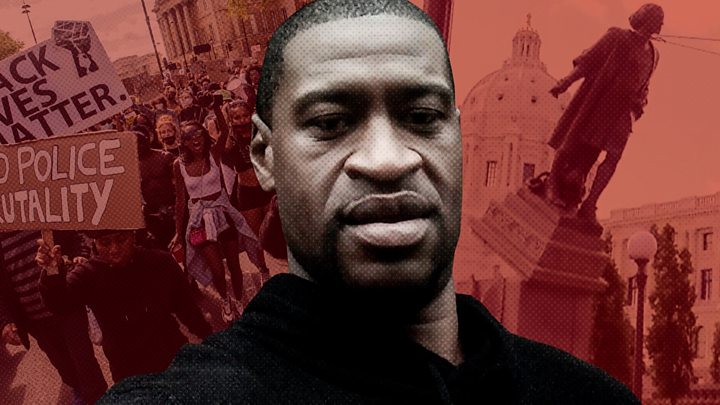
In his speech, the president mentioned "police misconduct" in passing, saying that the justice system would hold "wrongdoers" accountable.
"But what we can never have is a situation where things are going on as they are today, we must never allow mob rule," Trump said.
The president made no mention, however, of the 17-year-old who has been charged with murdering two protesters on Tuesday night. And when Vice-President Pence spoke of David Patrick Underwood, an Oakland officer who was killed, he implied that it was the protesters - not a man with right-wing affiliation - who has been charged with the crime.
There's a growing divide in the nation over who is at fault as protests sweep through American cities. The president is banking that those who side with police over the protesters will carry him to victory.
Attack Biden, again and again
If none of Republican's efforts to rehabilitate his image and restore confidence in the current state of US affairs are successful, their fallback plan has been to change this election from a referendum on the president to a choice between Trump and his Democratic opponent.
In 2016 Trump won despite having negative approval ratings because his opponent, Hillary Clinton, was seen as equally unfavourable. When voters who had misgivings about both candidates had to choose, they broke overwhelmingly toward Trump.
Over the course of the week, Republicans like party chair Ronna McDaniel and Pence took advantage of the lack of policy details in Democratic convention to paint Biden as in the thrall of the far left.
Others, like Senator Scott and Kentucky's Cameron, questioned his sensitivity on race issues - throwing several of Biden's more notable gaffes on race issues back in his face. Pence asserted that Biden would be too weak to protect the nation.
"The hard truth is you won't be safe in Joe Biden's America," Pence said.
In his Thursday night speech, Trump reprised all these attacks - and more.
"Biden's record is a shameful roll call of the most catastrophic betrayals and blunders in our lifetime," Trump said. "He has spent his entire career on the wrong side of history."
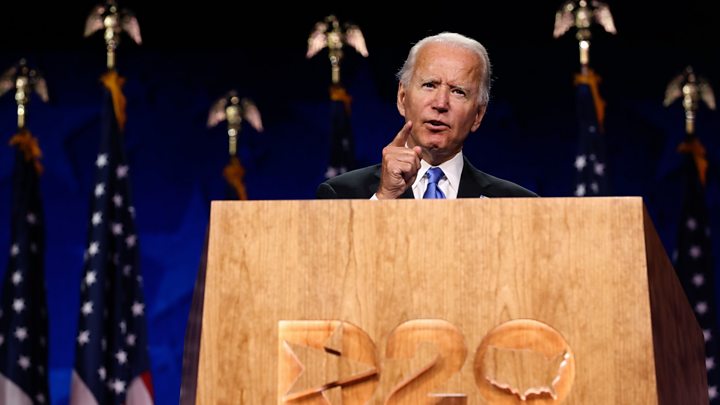
He paid particular attention to Biden's record supporting free-trade deals - a salient issue for him against Clinton in 2016, particularly in Midwest battleground states.
He warned that Biden would raise taxes and energy costs, encourage more undocumented migration, release criminals on the streets and "confiscate your guns.
It was a blunderbuss of attacks, of varying levels of validity, in the hope that some will draw blood.
"Biden is a Trojan horse for socialism," Trump said. "If Joe Biden doesn't have the strength to stand up to wild-eyed Marxists like Bernie Sanders and his fellow radicals, then how is he ever going to stand up for you?"
Us against them
Political outreach is all well and good, but modern-day elections are won as much by turning out your partisan faithful as they are by wooing the narrow segment of voters who are truly undecided.
Hence much of the Republican convention's rhetoric was geared toward motivating the president's base - warning them that the media, big technology companies, liberal "cancel culture" and "the elite class of so-called experts", in the words of South Dakota Governor Kristi Noem, are out to get them.
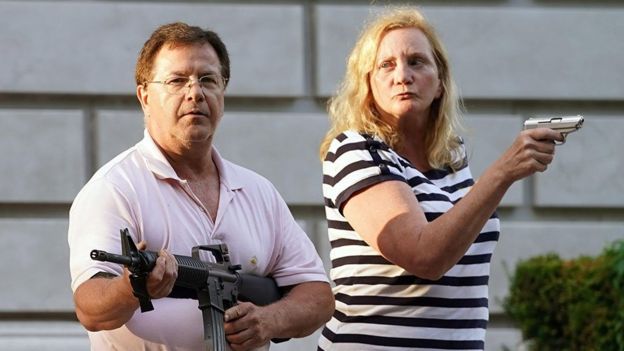 ALAMY
ALAMYMark and Patricia McCloskey, the St Louis couple who pointed firearms at Black Lives Matter protesters, suggested that the Democrats wanted to abolish the suburbs.
"If you stand up for yourself, the mob, spurred on by allies in the media, will try to destroy you," Patricia McClosky said.
Pence, in his Wednesday speech, said that Trump will protect American heritage. "If you want a president who falls silent when our heritage is demeaned or insulted, then he's not your man," he said.
Grievance has always been part of the fuel that has powered Trump's rise - a sense, among his supporters, that something valuable is slipping from their grasp and the unlikeliest of politicians, Donald Trump, is the one who will help them preserve it.
"Always remember," Trump said in a reprise of a line he has said before, "they are coming after me, because I am fighting for you."
It's the recipe for a bare-knuckle autumn campaign, as Trump and his supporters dig in for what will be a long, brutal battle to retain the presidency.


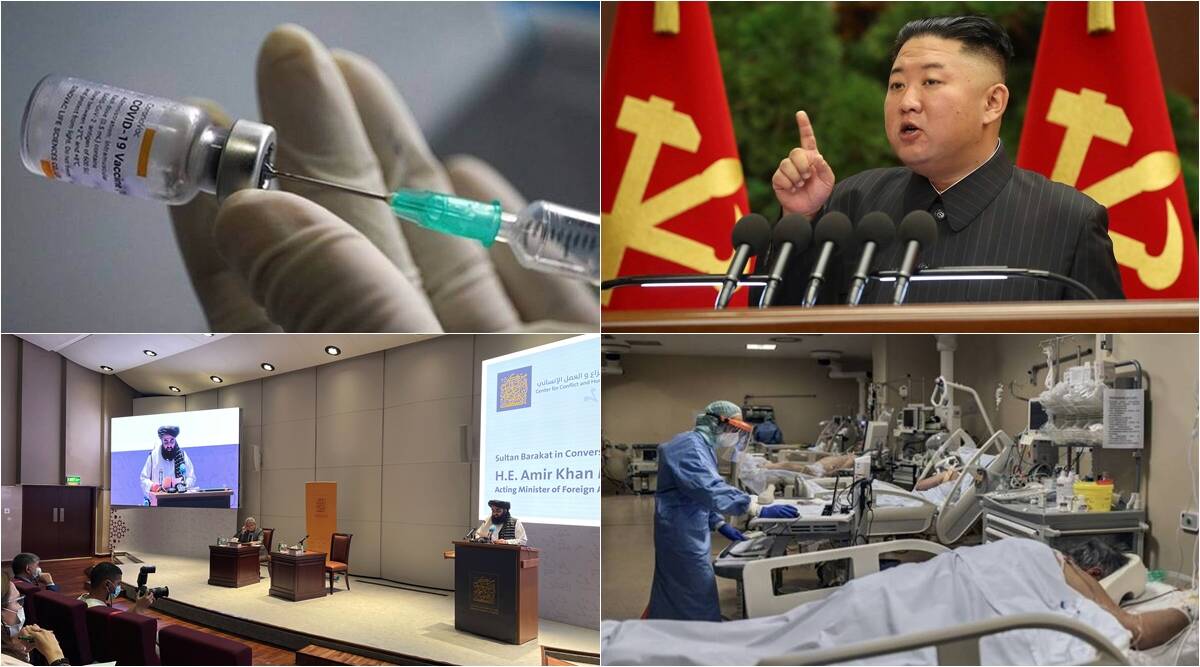



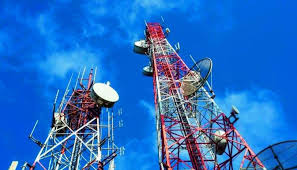


Comments